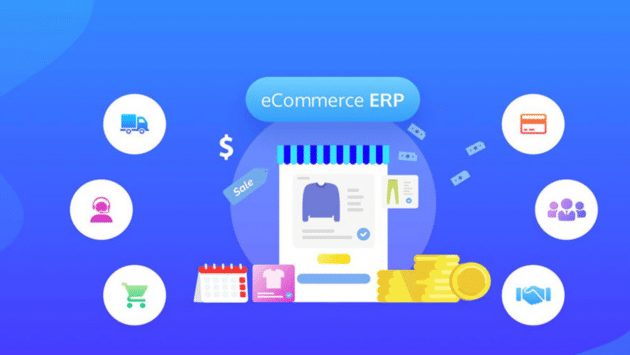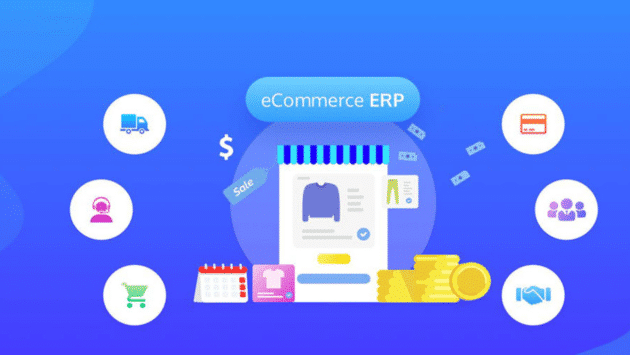ERP for E-commerce: A Powerful Solution for Streamlining Online Retail Operations – In the fast-paced and highly competitive world of e-commerce, businesses must constantly seek ways to streamline operations, manage growth efficiently, and provide a seamless customer experience. As e-commerce expands globally, many online retailers use Enterprise Resource Planning (ERP) systems to integrate and automate key business processes. ERP for e-commerce combines various business functions, from inventory management to customer relationship management (CRM), into a single platform, enabling companies to operate more efficiently and effectively.
In this article, we will explore how ERP systems enhance e-commerce businesses, the key features of ERP for e-commerce, the benefits it provides, and emerging trends in this space.

What is ERP for E-commerce?
ERP (Enterprise Resource Planning) is a software platform that integrates a company’s core business functions into a unified system. For e-commerce businesses, an ERP system combines inventory management, order processing, finance, customer service, supply chain management, human resources, and more into one centralized hub. By doing so, ERP software eliminates the need for separate, disconnected systems, reducing errors, improving efficiency, and enabling real-time data sharing across departments.
An ERP system tailored for e-commerce businesses specifically integrates with online storefronts and marketplaces like Shopify, WooCommerce, Magento, and Amazon. This integration allows businesses to manage their back-end operations and front-end customer interactions in one place, providing a comprehensive overview of the entire business.
Key Features of ERP for E-commerce
Inventory Management
Effective inventory management is crucial for e-commerce businesses, especially as they scale. ERP systems for e-commerce allow companies to track their stock levels in real time across multiple locations, warehouses, and sales channels. Automated reordering ensures that stockouts and overstocking are minimized. The system also allows for better control over inventory replenishment and demand forecasting, which can help prevent delays in order fulfillment.
Order Management
E-commerce companies must efficiently manage thousands of orders from different channels. ERP systems provide tools for order processing, tracking, and fulfillment, ensuring orders are processed smoothly from the moment they’re placed to delivery. These systems integrate with the e-commerce platform, automatically capturing orders and updating the back-end systems. This integration ensures that businesses can fulfill orders quickly, improve accuracy, and offer timely updates to customers.
Financial Management
ERP for e-commerce integrates financial management features, including accounting, invoicing, billing, and tax management. This helps businesses maintain accurate financial records and gain insights into profitability, cash flow, and expenses. Automated processes reduce the chances of human error and help ensure compliance with financial regulations. Furthermore, multi-currency and multi-country support is essential for e-commerce businesses that operate globally, allowing them to handle international transactions efficiently.
Customer Relationship Management (CRM)
A CRM module is often integrated into ERP systems, providing e-commerce businesses a holistic view of customer interactions and histories. CRM tools within ERP help manage customer data, track interactions, handle customer support inquiries, and improve customer service. This results in personalized marketing efforts and a better overall customer experience. Additionally, a CRM integrated with the ERP ensures that customer data, including orders and feedback, is readily available to all departments.
Shipping and Logistics
Managing shipping and logistics is one of the most complex tasks for e-commerce businesses. ERP systems can automate the shipping process, from selecting shipping carriers to tracking packages. By integrating with third-party logistics providers and shipping carriers, an ERP system can streamline the logistics workflow, ensuring orders are timely. Additionally, businesses can track shipments and share tracking information with customers, improving transparency and customer satisfaction.
Returns Management
Handling returns efficiently is vital for any e-commerce business. ERP systems include return management capabilities, enabling companies to track return requests, process refunds or exchanges, and manage returned inventory. By automating and streamlining the returns process while minimizing the costs of handling returns, companies can improve customer satisfaction.
Reporting and Analytics
One of the most valuable features of ERP systems is their ability to generate comprehensive reports and analytics. For e-commerce businesses, real-time data on sales performance, inventory levels, customer behavior, and financials is critical for making informed decisions. ERP systems provide customizable reports that allow business leaders to track key performance indicators (KPIs), identify trends, and make data-driven decisions to optimize operations and drive growth.
Multichannel Integration
Most e-commerce businesses sell products across multiple platforms, including websites, social media, and marketplaces like Amazon and eBay. ERP systems can integrate with these platforms to consolidate sales data and ensure consistent pricing, inventory, and order management across all channels. This multichannel integration reduces the complexity of managing multiple storefronts and provides a unified inventory and order fulfillment approach.
Benefits of ERP for E-commerce
Increased Efficiency
One of the primary advantages of ERP for e-commerce is the automation of time-consuming, manual tasks. By integrating all business processes into one platform, an ERP system eliminates the need for repetitive data entry, reducing the risk of errors and freeing up employees to focus on more strategic tasks. Automated processes, such as order fulfillment and financial reconciliation, ensure that operations run smoothly and efficiently.
Improved Inventory Management
Maintaining accurate inventory levels is essential for e-commerce success. ERP systems provide real-time inventory visibility, ensuring that stock levels are up-to-date across all sales channels. This reduces the risk of stockouts or overstocking, helps optimize inventory holding costs, and ensures timely fulfillment of customer orders. Additionally, improved demand forecasting helps businesses plan inventory replenishment more effectively.
Better Customer Experience
ERP systems improve customer experience by streamlining order processing, shipping, and customer service. Customers receive their products on time when orders are processed quickly and accurately, leading to higher satisfaction. Furthermore, a CRM module integrated into the ERP allows businesses to offer personalized interactions, track customer preferences, and resolve issues more effectively, leading to stronger customer relationships.
Scalability
As e-commerce businesses grow, so do their operational complexities. ERP systems are scalable and can grow alongside the company. Whether adding new sales channels, expanding into international markets, or handling increased order volumes, ERP systems can support growth without needing major system overhauls. This scalability ensures that the business can continue to operate efficiently even as it expands.
Enhanced Financial Accuracy
Financial management in e-commerce can be challenging, especially with the complexities of handling payments, taxes, and multi-currency transactions. ERP systems improve financial accuracy by automating accounting tasks, generating real-time financial reports, and ensuring compliance with tax regulations. The system also consolidates data from different channels, providing a clear view of the business’s economic health.
Data-Driven Decision Making
ERP systems provide valuable insights into various business aspects, from sales performance to customer behavior and inventory levels. With access to real-time data and customizable reports, business leaders can make informed decisions to improve efficiency, reduce costs, and capitalize on growth opportunities. These data-driven insights can lead to better decision-making and long-term success.
Streamlined Supply Chain Management
Effective supply chain management is critical for e-commerce businesses, particularly those with global suppliers. ERP systems automate supply chain processes, from procurement to shipping, ensuring that materials and products move efficiently through the supply chain. By optimizing these processes, businesses can reduce lead times, lower costs, and ensure customer orders are fulfilled quickly and accurately.
Future Trends in ERP for E-commerce
As e-commerce continues to evolve, ERP systems are expected to incorporate more advanced features and technologies to meet the changing needs of online retailers. Here are a few emerging trends in ERP for e-commerce:
AI and Machine Learning
Artificial intelligence (AI) and machine learning (ML) transform ERP systems by enabling predictive analytics, process automation, and improved decision-making. In e-commerce, AI-powered ERP systems can forecast demand, optimize pricing strategies, and provide personalized product recommendations. Machine learning algorithms can also analyze customer behavior and trends to enhance marketing and sales efforts.
Mobile ERP Solutions
As mobile commerce (m-commerce) grows, ERP systems become more mobile-friendly. Mobile ERP solutions allow business owners and managers to access key data, track orders, manage inventory, and communicate with suppliers from their smartphones or tablets. This mobile access provides greater flexibility and enables businesses to stay connected, even on the go.
Cloud-Based ERP
The shift to cloud-based ERP solutions is gaining momentum in e-commerce. Cloud-based ERP systems offer greater flexibility, scalability, and cost-effectiveness than traditional on-premise systems. They enable businesses to access their ERP system from anywhere, reduce IT infrastructure costs, and benefit from automatic software updates. As e-commerce businesses expand globally, cloud-based ERP systems will become increasingly important for managing remote teams and global operations.
IoT Integration
The Internet of Things (IoT) is beginning to impact e-commerce and ERP systems. IoT devices, such as intelligent sensors and RFID tags, can provide real-time data on inventory levels, shipment tracking, and equipment performance. By integrating IoT data into ERP systems, businesses can improve supply chain visibility, enhance inventory management, and reduce operational downtime.
Blockchain for Supply Chain Transparency
Blockchain technology is gaining attention for its potential to enhance transparency and security in supply chains. For e-commerce businesses, integrating blockchain with ERP systems can provide a tamper-proof ledger of transactions, improve traceability of goods, and ensure that products are sourced ethically. Blockchain integration could become a valuable tool as consumers demand more product transparency.
Conclusion
ERP systems have become essential for e-commerce businesses looking to streamline operations, scale efficiently, and improve customer satisfaction. By integrating key business functions such as inventory management, order processing, finance, and CRM into a single platform, ERP systems help e-commerce companies operate more effectively and make data-driven decisions. As technology evolves, ERP systems will incorporate advanced features like AI, IoT, and blockchain, further enhancing their value to online retailers. For any e-commerce business looking to stay competitive in today’s digital marketplace, implementing an ERP system is a strategic investment that can drive long-term growth and success.

